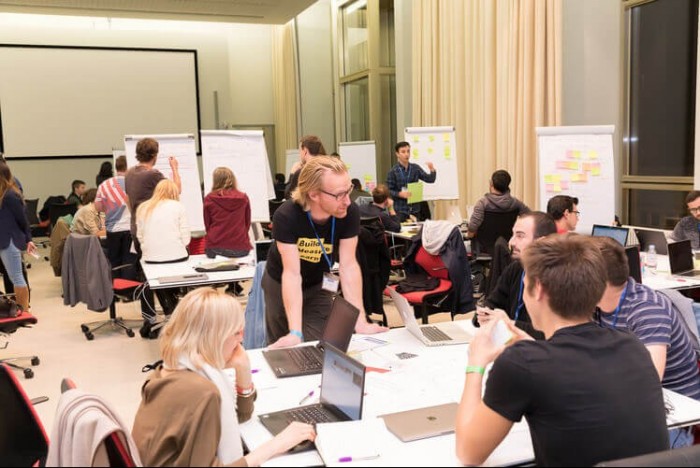Thankfully, that’s not all a hackathon is about. Originally developed as all-night events for groups of coders to ‘hack’ problems and create innovative products, hackathons have experienced a growth in popularity in recent years, especially among business schools.
Now, the hackathon isn’t just for tech students, but for anyone who wants to put their problem solving, decision making, and entrepreneurial skills to the test in an intensive environment.
For business school students, hackathons offer the unique opportunity to collaborate with tech students and solve business problems in an extremely short amount of time—usually overnight, and with little sleep.
Hackathons now can be designed around a multitude of different topics, with students providing solutions to problems within sustainability, education, or technology, to name just a few.
A business school first
Demis Estabridis had already organized hackathons in his native Peru but wanted to bring the hackathon experience to the world of business education when he started his MBA at ESMT Berlin at the beginning of this year.
While his previous hackathons were about encouraging creativity in his existing team at UTEC university in Lima, his vision for the hackathon at ESMT revolved around bringing together strangers from different ends of the business spectrum to create solutions for the future of education.
“I had realized that it was very insightful for business people and tech people to share mindsets,” he explains. “It’s usually hard to bring these people together before MBAs go into a new job.”
In Berlin, Demis explains, there is already a strong hackathon community, with events happening almost every weekend. But until the ‘Hacknight’ organized by Demis and his colleagues in the ESMT Entrepreneurship Club, the school had never organized one itself.
“ESMT supported the idea from the very beginning; they loved the reason why we were doing this kind of event,” Demis notes. “And we managed to bring a lot of people together that had no previous experience in hackathons, which was also part of the plan!”
While Demis has seen a growing interest in hackathons within students and staff at business schools, he says there’s another new player in the hackathon game—traditional corporations.
“Companies are doing a hackathon to gather new ideas and to innovate, and startups are also using them to found teams that can build those ideas for them,” Demis explains. “But also for simply recruiting new people—hackathons are the new way of recruiting top tech talent.”
‘Hacking’ sustainability
“My idea of a hackathon is analysing in a very deep way specific topics,” says Alessandro Brun, director of the Masters in Global Luxury Management at MIP Politecnico di Milano.
Alessandro and his students on the Masters program at MIP recently took part in a hackathon at Yale School of Management—the initial idea for which began with global fashion brand Prada, who wanted to organize an event that could make a difference in the world of sustainable fashion.
With a campus in Milan, MIP is active in the field of luxury management, and when Prada contacted them to organize an interactive event, Alessandro saw a chance to organize a hackathon.
“Students are the ones who will be most impacted by unsustainable practices in the future, so I thought, ‘Why don’t we involve them in the conversation?’” he explains.
The result was a weekend trip to Yale, during which three teams from MIP worked on solutions to the problem ‘Shaping a Sustainable Digital Future’.
“The students worked more or less until midnight in a very very intense way, but it was a lot of fun as well,” Alessandro recalls. “The next morning they reconvened to make a Powerpoint presentation, and by noon they were done.”
Hackathons are the perfect way to engage the millennial generation, Alessandro believes—”I have noticed that their attention spans are getting shorter and shorter,” he remarks. But he also sees admirable qualities in the new business generation that make hackathons even more impressive.
“At the same time, I think our students are better in multitasking and making quick decisions than I was at their age,” he adds. “And believe me, the level of quality that they were able to develop in 24 hours was amazing.”
Hacking traditional work environments
In Asia’s fast-growing world of technology and business, the hackathon is also gaining recognition. At the Hong Kong University of Science and Technology (HKUST), a student-led hackathon last year attracted a record 622 participants from 19 different countries.
The event received a similar interest in 2018, with 422 participants, and was sponsored by international company Uber. Prizes offered for the winning teams this year amounted to $40,000, and included paid internships at Uber and Alibaba HQ.
Students on the HKUST hackathon, based around cryptosecurity, also had access to the world’s second-best supercomputer—the Tianhe-2—to test out their hacks during the event, giving the event a much more technological edge than other modern business school hackathons.
As the South China Morning Post reported last year, Chinese companies, in particular, have been slower to embrace the hackathon than other areas of the world, as traditional management styles have usually held out against this new creative and spontaneous style.
In September this year, Swiss fintech startup accelerator F10 also held their first hackathon specifically for fintech ideas in Singapore, held at Singapore Management University (SMU). The event was focused around four topics, including the role of blockchain and the future private banking. F10’s event attracted 90 participants from 29 nationalities.
So, interest in hackathons is high in China, among both students and corporations. With business schools operating in a more creative environment than larger multinationals in the country, they could be the driving force that make hackathons a staple of work life in China and the rest of Asia.
Student Reviews
ESMT Berlin
RECAPTHA :
2c
44
1a
9c









